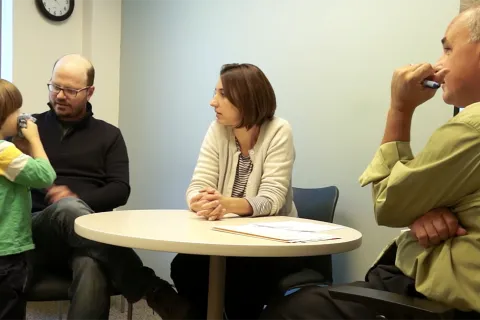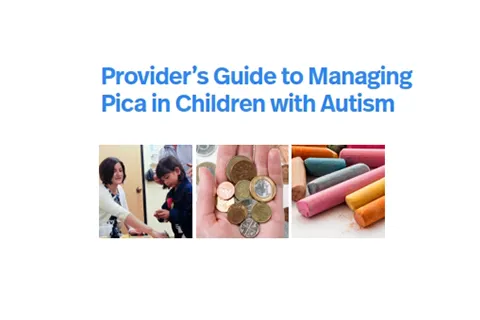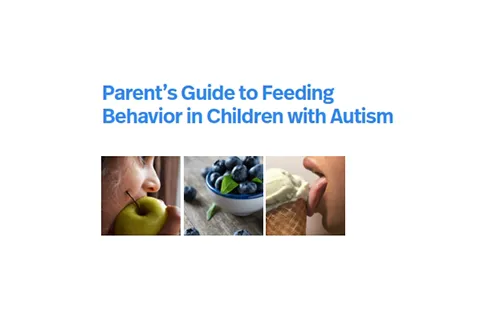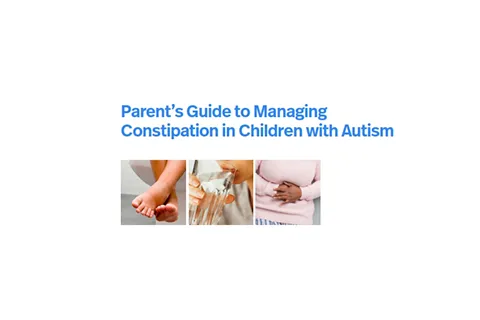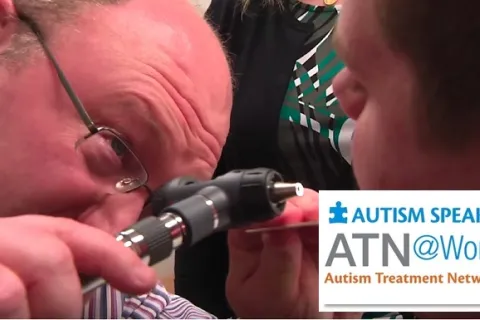Video: Acid reflux Q&A with GI Specialist Tim Buie
Thank you for your tremendous response to the first segment in Autism Speaks’ “Office Hours” series with GI specialist Timothy Buie – “Acid Reflux and Autism” (above). Dr. Buie is the director of pediatric gastroenterology and nutrition at MassGeneral Hospital’s Lurie Center for Autism, in Boston, one of 14 sites in the Autism Speaks Autism Treatment Network.
We asked Dr. Buie to answer as many of your follow-up questions as possible. Because we received so many questions – on a broad array of autism-related GI issues – this first Q&A will focus on concerns directly related to reflux.
Disclaimer: The following information is for educational purposes only. It is not intended to diagnose or treat, nor should it take the place of personal consultation with a medical professional. Always seek the advice of your physician or other qualified healthcare provider before starting any new treatment or discontinuing an existing treatment. Talk with your healthcare provider about any questions you may have regarding a medical condition
Before I begin answering some of the questions we received, I want to say thank you to the many people who responded so positively to our first “Office Hours” video. I see many children in our clinic, but realize that the autism community’s need for GI care goes far beyond my practice and that of other pediatricians, pediatric gastroenterologists and nutrition experts who understand the autism-GI connection. One of my goals is to address this great unmet need by sharing my clinical experience with parents and professionals. Thank you so much for your questions.
Question: Thanks for doing this video series. In the first video, you mention that children who constantly chew on their shirts could be indicating reflux. Our child does this. Should we call a gastroenterologist?
Dr. Buie: Not all gastroenterologists will recognize this as a reflux symptom in a patient with autism. Other reasons for this type of behavior can include teething or a need for sensory input, which your child’s physical therapist or occupational therapist might recognize. However, reflux needs to be on this list of considerations. I would recommend asking your pediatrician to consider reflux in the context of other symptoms and possibly conduct a trial of treatment, tests for the condition or a referral to a gastroenterologist. It may help to have your child’s doctor view last week’s “Acid Reflux and Autism” video segment. It has useful information for medical professionals as well as families.
Question: Our son was initially diagnosed with obsessive compulsive disorder (OCD) for symptoms that included excessively chewing food and taking an excessively long time to eat a meal. Are these common symptoms for reflux in nonverbal or minimally verbal children with autism?
Dr. Buie: As you know, autism’s core symptoms include repetitive behavior. We tend to think of this in terms of continuously playing with the same toy or doing the same thing over and over. Disordered eating behaviors have been described in OCD and in PANDAS. PANDAS is a rare neurological condition that can follow strep infection and involve OCD-like behaviors. (Also see “What is PANDAS? How Is It Different from Autism?”) Many psychiatrists won’t consider making the diagnosis of OCD in the presence of autism.
Gastrointestinal conditions that could be associated with excessive chewing, prolonged eating times and sometimes difficulty swallowing could indeed include acid reflux. Also, I would consider esophageal inflammation from other conditions such as allergic or eosinophilic esophagitis. This condition often causes these symptoms because it involves difficulty swallowing. Esophageal motor or structure problems such as achalasia or strictures could also present with these symptoms. I do think seeing a gastroenterologist to sort these possibilities would be helpful and appropriate.
Question: I know my son has acid reflux. What steps can we take to control the regurgitation. We've tried and are still working on getting him to eat slower. Are there any medications you recommend?
Dr. Buie: The most common treatments for acid reflux are antacids. By reducing reflux, this often reduces regurgitation, vomiting and spitting up. But in some patients with reflux, there is a problem with the mechanical emptying of the esophagus and the stomach. Antacids don’t help with these issues. In these situations, expert treatment may need focus on the physical problem. In addition, smaller more frequent feeds can often help. We also know that foods high in fat can slow stomach emptying. So limiting fatty foods may help as well. I also suggest limiting foods containing caffeine because they can likewise worsen reflux. We have a number of medications that enhance stomach emptying. However, they have side effects that need to be monitored closely. I suggest discussing a possible prescription with a pediatric gastroenterologist.
One other important point I would raise with a specialist is the possibility of rumination. Rumination involves voluntarily regurgitating swallowed food and stomach content. It’s common in patients with autism and may be a repetitive “stimulatory” behavior. Research has identified a number of behavioral therapy strategies for addressing the issue. I’ve also seen rumination reduced by treating reflux.
Question: Thank you! Thank you! Thank you!!!! They put my little girl on Zantac last May at the age of 2.5 years old because she was throwing unprocessed food at night. When we finally got into a pediatric GI, she was more concerned that our daughter, now three, had gained 14 pounds since May. She thought our daughter had Prader-Willi syndrome. My questions: Does Zantac make you gain weight? Does it sound like something's more serious? How can I help our daughter with the constant eating? She's finally verbal and able to tell me her tummy hurts and points to her chest.
Dr. Buie: This is a complicated issue, and I’m glad you were able to see a pediatric gastroenterologist. As she may have explained, Prader-Willi is a genetic condition associated with significant developmental delays, excessive appetite and weight gain. We have readily available screening tests for the condition, and I would ask for that.
If Prader-Willi is excluded, I would wonder if the excessive eating is coming from ongoing stomach upset. When acid-controlling medicines don’t work, food can serve as a buffer against stomach acid. So eating may be your daughter’s attempt to relieve her discomfort. I call this “eat to treat.” One problem with H2-receptor blockers such as Zantac is that the benefit tends to be lost with regular use over time. This doesn’t appear to be the case with proton pump inhibitor medicines such as the Prevacid Solutabs. So, if your daughter benefits from these medicines, they may be a more lasting solution. It’s possible that the reflux treatment is not sufficient for your daughter and that additional support could include a medicine focused on stomach emptying.
I don’t think increased appetite is a typical side-effect of either class of medicine. However, we do see significant weight gain associated with many of the behavioral medicines used to ease irritability and other behavioral challenges associated with autism. I encourage you and her doctor to discuss all the medications she is taking for their potential to produce weight gain.
Question: Can reflux show as severe pain in chest? Scary like a heart attack kind of scene? My son has panicked with chest pains, but his heart is okay.
Dr. Buie: Yes, reflux can cause significant chest pain. We also see brief episodes of chest pain with esophageal spasm. I encourage you to discuss these possible diagnoses with your son’s healthcare provider as we have treatments for both.
Question: Is burping continuously from acid reflux a stress response?
Dr. Buie: There are many possible reasons for frequent burping. We see it – as well as frequent hiccupping – with acid reflux. It can also result from poor gastric emptying that causes gas to build up in the stomach. Signs of excessive gassiness can include abdominal distention and flatulence.
One consequence of frequent burping is that it can bring stomach acid into the esophagus to cause injury (esophagitis). Reflux treatments may be helpful. I also suggest reducing foods that contribute to gas. I would also consider related digestion problems such as lactose intolerance. We also see frequent burping with intestinal overgrowth conditions as well. I encourage you to discuss these possibilities with your healthcare provider.
Question: Dr. Buie, thank you for your care and concern of the autistic population with gastric problems. My 35-year-old autistic son is always jamming his finger down his throat and has difficulty swallowing. He has had a procedure to open up his throat and is on medication daily. But still has throat issues. Do you think probiotics would help his gastric problems? I do watch his diet so as not to get many offending foods.
Dr. Buie: It sounds like your son’s doctors should continue to closely follow these persistent symptoms. Often, procedures that open up narrowing in the esophagus provide temporary relief. As a result, he may need repeat procedures or a more-permanent intervention, depending on the diagnosis. Achalasia, for instance, involves an inability to relax the esophageal sphincter, or outlet. It may respond temporarily to a dilatation procedure, but require surgery for lasting relief.
However, these procedures don’t always restore esophagus function. As a result, reflux may remain a problem. If he is still putting his fingers down his throat and swallowing remains difficult, I would consider talking with his doctor about more-intensive treatments or reevaluation.
I’m not confident that probiotics would help relieve these problems.
Question: Thank you so much for this video. In under 5 minutes, you described my nine-year old son. He had terrible reflux as a baby with outward symptoms like spitting up. A few years ago, he started hand biting, chewing his fingers, face tapping. His shirt sleeves and collars are constantly wet. He rolls on his therapy ball almost every morning after breakfast. He has limited language but sometimes lets us know his tummy hurt.
We did a course of Zantac when our pediatrician suspected gastritis and did see some improvement. But it seems to come back during the winter. The past six months, he son has started self-limiting his diet and over the past month has all but given up lunch at school. Where do we start other than finding a good GI? I feel overwhelmed, and it would be helpful to be armed with more information.
Dr. Buie: The mouthing behaviors you describe could have other explanations. However, given the signs of abdominal pain, I believe a gastroenterologist would consider treatment or additional evaluation to sort out your son’s discomfort.
As I mentioned in a previous answer, H2-receptor blockers such as Zantac sometimes lose effectiveness over time. This frequently occurs with this entire class of medicine. Your son’s original positive response to treatment suggests that reflux or acid-caused gastritis could well be the cause of his symptoms. I suggest talking with his pediatrician about considering a change to the proton pump class of medications. We use these medicines frequently for reflux, but they need close monitoring for side effects if used long term. If your general pediatrician isn’t comfortable prescribing these medicines, a referral to a pediatric gastroenterologist would be valuable.
Question: Thank you very much for this series. Very helpful information from Dr. Buie's interview. My 7-year-old has acid reflux since infant (pain, throw up, sleep issues, etc.) and had been on PPIs (Omeprazole, Prevacid, Nexium, pantoprazole), H2 blockers (Zantac, Pepcid, Axid), motility drugs (low dose arithromycine, bethanichole) with not really good results. Disappointed with medications and concerns of their side effects, we slowly weaned him off all medications a year ago and have been using diet/life style modifications (probiotics; avoid dairy, acidic foods/drinks and other trigger foods; elevated bed; not eating 4 hours before sleep). However, he still has symptoms about 30-40% of the time. Two questions: Anything else we can do to help with his symptoms and strengthen the esophageal sphincter vale? We heard about the Stretta procedure which uses radiofrequency to heat and thicken the esophageal muscles. Could give us some advice of the pros and cons? We don't want to do invasive surgery like fundoplication.
Dr. Buie: It definitely sounds like you’ve worked through a lot of possible treatments with limited benefit. The decision to do surgery such as a fundoplication (which “wraps” the lower esophagus surgically with the upper portion of the stomach) is not offered lightly and is usually reserved for patients who are aspirating stomach contents into the airway or have unresolved esophagitis despite treatments. There are surgeons now that do this procedure in a way that limits complications and hospital time.
The Stretta procedure is one of several newer procedures (originally approved by the FDA in 2000) aimed at tightening the lower esophagus without surgery. Research shows good effectiveness in adults. But I’m not aware of studies or trials with children.
I think this is a case where expertise beyond a pediatric gastroenterologist may have value. Several centers have motility experts focused on severe disease states like reflux. These providers are pediatric GI physicians with additional training in this area, and they may be able to offer suggestions involving additional therapies or combination of therapies. These providers likewise will be aware if pediatric trials for non-invasive reflux management are available. I suggest talking with your family doctor about a referral to one of these centers.
Question: My 7-year-old son has moderate to severe ASD and doesn't speak. He has many of the same symptoms you speak about. He’s always chewing his shirt and putting things in his mouth and now has a chew tube around his neck. But we had an upper-level endoscopy done, and they said there was nothing. But on the next visit the doctor said it had been reread and there may have been mild inflammation but nothing to indicate any problems. Sometimes he cries for no reason that we can discern but it seems like he is in pain. He doesn't really indicate it is his stomach. What should be my next step?
Dr. Buie: Based on your description, I strongly suspect that reflux could be a problem. Only some individuals with acid reflux develop esophagitis or other injury in the esophagus. Even if the biopsies are normal, reflux can be causing heartburn and symptoms. If the biopsies showed inflammation, I think this adds support to the possibility. Options include asking for a trial of treatment for reflux based on symptoms and then monitoring symptoms to see if there’s benefit. Another option is to discuss the findings with your pediatrician and decide on whether treatment or a second opinion might have merit.
Question: My son is 9 years old. About two years ago, he got a gastritis infection. The ER doc prescribed 14 days of Nexium. Those 14 days were some of his best days. Once he was off the medicine, he went back to his usual difficult behaviors and eating all the time. I asked our primary care physician if my son could take Nexium regularly, and she would not agree at all. Is there anything else I could try to help him?
Dr. Buie: As I mentioned earlier, we have real concerns about the long-term use of proton pump medication, which is the class that includes Nexium. These concerns include diminished bone density or osteoporosis and possibly reduced absorption of nutrients including vitamin D, magnesium and iron. Because of these concerns, we closely monitor patients who need to stay on the medicine. At the same time, we see children who clearly need this medicine to treat severe reflux and its serious side effects.
Typically, what we will do is give the medicine long enough to heal the reflux-associated esophagitis. Usually, this is at least several weeks followed by a reassessment of symptoms. I encourage you to ask your son’s doctor for a referral to a gastroenterologist if she is uncomfortable prescribing a medicine that seemed so helpful to him.
Question: Is it okay to keep giving our daughter over-the-counter antacids like Tums? The doctor just tells us everything is fine and prescribes Zantac. I know something is wrong. But given our child’s behavioral issues, testing is traumatizing, exhausting and stressful.
Dr. Buie: Using medicines like Tums or Zantac can be reasonable for occasional distress, so long as you are using the proper dose. Typically, however, they’re not sufficient for long-term management of reflux. It’s true that some of the testing is difficult, but it may be worth the consideration if there is ongoing misery.
Research with adults suggests that reflux symptoms that occur more than once a week suggest increased risk of esophagitis. I consider this when discussing treatment that goes beyond occasional antacids.
One of the reasons I began focusing on children with autism in my practice was my realization that their communication impairments made it difficult to determine when “everything is fine.” When evaluating a verbal child, it’s easier to identify when the pain is above the belly button or in the chest. With nonverbal patients, we’re helped by signs such as spitting up or regurgitation, especially if they occur around mealtime. We also consider reflux when chronic cough or wheezing doesn’t respond to asthma treatments.
Research also tells us that when parents have concerns about underlying medical problems, they are usually right. If you are worried, keep advocating for your child and ask for additional guidance and referral to a GI specialist.



